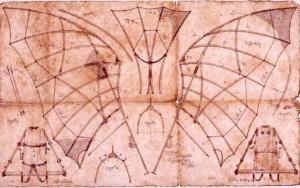Was Leonardo Da Vinci Innovative?

Let’s tweak it, Leo.
We all know that Leonardo Da Vinci was a genius. But was he innovative?
The question draws a distinction between invention and innovation and between creativity and construction. As Wikipedia puts it, “[Da Vinci] conceptualized a helicopter, a tank, concentrated solar power, an adding machine, and the double hull, also outlining a rudimentary theory of plate tectonics. Relatively few of his designs were constructed or were even feasible during his lifetime….”
In other words, Leonardo had great ideas but many of them were never implemented. So, were they innovations?
That leads to another question: why did Britain lead the way in the Industrial Revolution? Other countries – notably France, Germany, Italy, and Sweden – had great universities and well established scientists and laboratories. Why did Britain create the industrial surge while others followed?
That’s the question that Ralf Meisenzahl and Joel Mokyr address in their working paper published by the National Bureau of Economic Research. Their short answer: Britain didn’t have more geniuses than other countries, but it did have more tweakers and implementers.
Meisenzahl and Mokyr argue that Britain certainly had its fair share of “hall-of-fame” inventors. But many of those genius ideas would not have been turned into practical innovations if not for “…a group of skilled workmen who possessed the training and natural dexterity to … carry out the ‘instructions’ contained in the … blueprints, … build the parts … with very low degrees of tolerance, and … fill in the blanks when the instructions were inevitably incomplete.”
Meisenzahl and Mokyr try to distinguish between tweakers and implementers. Tweakers “…improved and debugged an existing invention.” Implementers were “…skilled workmen capable of building, installing, operating and maintaining, new and complex equipment.”
Meisenzahl and Mokyr identified 758 men and one woman (Elenor Coade “who invented a new process for making artificial stone…”) whom they could classify as tweakers or implementers. Each person in the database was born between 1660 and 1830. Meisenzahl and Mokyr studied the industries they worked in, what they did, how they were incented, and how they acquired their skills. Among their key findings:
- The apprenticeship system was critical – it produced not only knowledge but also the skill to produce finely tuned machines. It also provided talented youngsters with a stable environment while they acquired and honed their skills.
- Multiple incentives were available. Much has been made of the British patent system in spurring innovation. But the authors argue that a system of prizes was equally or more important. Organizations such as the Society of Arts offered prizes for the development of specific devices, such as a machine to manufacture lace. Many such prizes were awarded “on the condition … that no patent was taken out” – which allowed the innovation to spread more rapidly.
- A “mechanical culture” – the authors point out that, “The second half of the eighteenth century witnessed the maturing of the Baconian program, which postulated that useful knowledge was the key to social improvement. In that culture, technological progress could thrive.”
So Britain not only had its fair share of geniuses but also had a well organized cadre of people who could tweak, improve, and implement the ideas the geniuses handed on. Just think what Leonardo might have done.